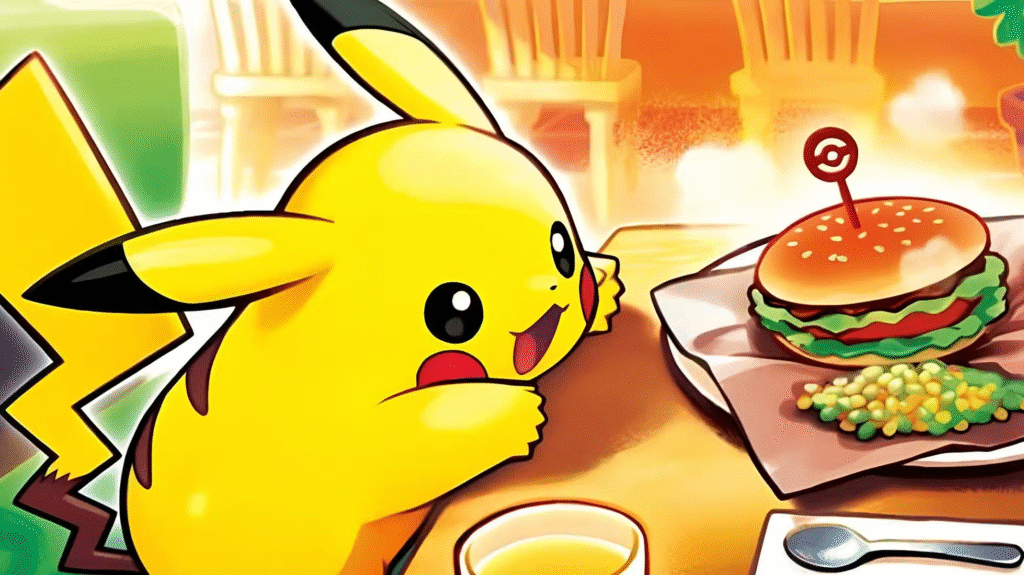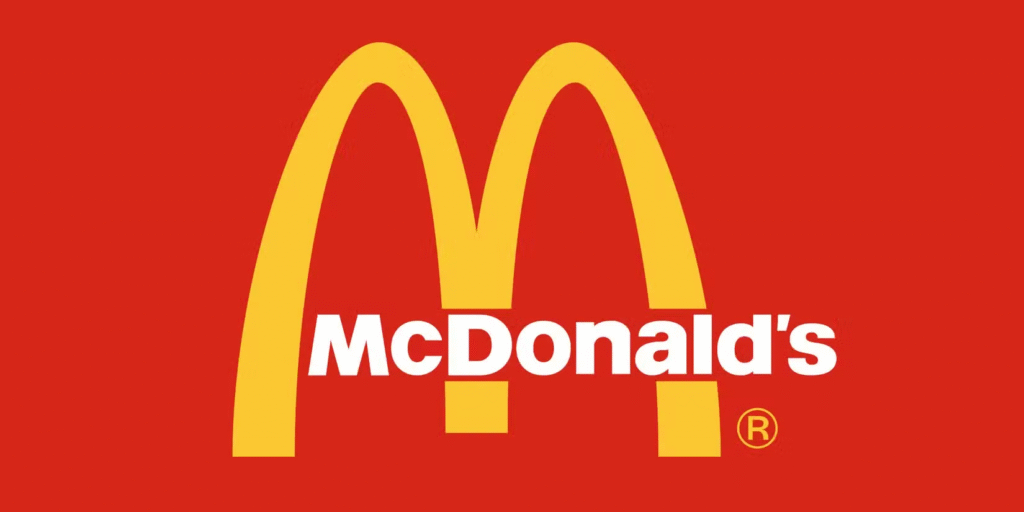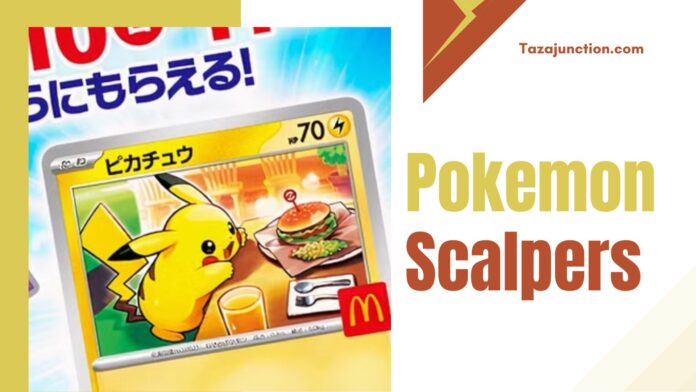In recent years, the intersection of fast food and collectibles has become a hotbed for controversy, especially when it comes to limited-edition promotions.
One of the most talked-about issues is the rise of McDonald’s Pokemon scalpers, who have been exploiting promotional campaigns by purchasing bulk quantities of exclusive Pokémon-themed products. Now, McDonald’s is stepping up to address the problem head-on.
The fast food giant recently announced new measures aimed at curbing the scalping of Pokemon cards and merchandise during its popular promotional events.
The company’s initiative is in response to growing concerns from families, collectors, and even store employees who have witnessed firsthand the frenzy that these promotions create.
The effort marks a significant shift in McDonald’s marketing approach and speaks volumes about the influence of collectible culture in modern commerce.
Also, you can run through how this Pokemon Scarlet and Violet distribution event works and why it matters to both veterans and fresh players.
Table of Contents
The Problem with McDonald’s Pokemon Promotions
McDonald’s has collaborated with The Pokémon Company multiple times over the past decade, offering exclusive Pokémon cards and toys as part of its Happy Meal promotions.
These campaigns have consistently drawn enormous attention—not only from children and fans of the franchise, but also from opportunists looking to profit off the limited-edition items.
In several past promotions, McDonald restaurants across multiple countries saw customers buying dozens—even hundreds—of Happy Meals just to get the included Pokémon cards.
This led to limited stock, disappointed customers, and significant food waste. The rise of McDonald’s Pokemon scalpers not only impacted genuine fans and families but also prompted backlash on social media and forums.
With Pokémon card values skyrocketing in online marketplaces, scalpers were quick to realize the opportunity. Some even began reselling individual cards or sealed Happy Meal packs at several times their original value.
McDonald’s Response: A Plan to Stop Scalping

Following repeated incidents and growing public pressure, McDonald’s has unveiled a multi-faceted strategy to deter McDonald’s Pokemon scalpers and preserve the integrity of future promotions.
1. Purchase Limits Per Customer
One of the first steps includes strict limits on how many Happy Meals or promotional items a single customer can buy per visit. This will be enforced at the point of sale, and franchisees are being given clear guidance on implementing the policy.
By capping purchases, McDonald’s aims to give every family a fair shot at obtaining the collectibles, rather than letting a few buyers hoard the entire stock.
2. Decoupling Cards from Meals
In select markets, McDonald’s has begun offering the Pokémon cards as standalone purchases rather than attaching them exclusively to Happy Meals.
This reduces unnecessary food waste and may help control bulk buying. The separation also allows for better stock tracking and enforcement of purchase limits. However, this model is still in the testing phase and has yet to be rolled out globally.
3. Online Reservation Systems
Some regions are experimenting with online reservations or ticketing systems. Customers can sign up in advance and secure a time slot to pick up their promotional packs.
This digital solution may be one of the most effective tools in limiting the influence of McDonald’s Pokemon scalpers, as it brings transparency and structure to the purchasing process.
The Role of Franchise Owners
McDonald’s operates thousands of independently owned franchises, which can create inconsistencies in how promotions are handled. In the past, some franchisees turned a blind eye to bulk purchases or scalping behavior, often due to lack of guidance or pressure to clear inventory.
Now, corporate McDonald’s is offering standardized policies, training materials, and support to ensure local stores understand the importance of curbing scalping. The focus is on promoting a family-friendly environment rather than enabling secondary market profiteering.
Franchise owners are also being encouraged to monitor in-store activity more closely, and some have even implemented employee-only early access to avoid backdoor sales—another tactic some McDonald’s Pokemon scalpers have reportedly used.
Public Reaction and Community Feedback
The announcement has been met with generally positive responses from parents, collectors, and Pokémon fans. Many agree that limiting scalping behavior will restore fairness and accessibility to the promotional events.
“I just want to get my kid a Happy Meal and a fun card without having to compete with people buying 50 meals,” one parent said in a Reddit discussion. “This should’ve happened years ago.”
Collectors who were once unable to secure full sets due to low availability are hopeful that future campaigns will be more inclusive and balanced. However, some worry that scalpers will still find loopholes, such as visiting multiple locations or using different identities to bypass the new rules.
Nonetheless, the decision to target McDonald’s Pokemon scalpers marks a shift in how brands are recognizing and responding to the dark side of collectible culture.
Why This Matters Beyond McDonald’s?

The issue of scalping isn’t unique to McDonald’s or Pokémon cards. Similar problems have plagued the retail and entertainment industries—especially during product launches, limited-edition drops, and collaborative campaigns. Whether it’s sneakers, video game consoles, or trading cards, scalpers continue to exploit limited inventory for personal profit.
McDonald’s crackdown on McDonald’s Pokemon scalpers may inspire other companies to rethink how they manage promotions and engage with collectors.
The fast-food chain has a unique platform with massive influence, and its decision to address scalping sends a powerful message to the industry.
Lessons from Previous Campaigns
Looking back, McDonald’s has learned a lot from the backlash to earlier Pokemon promotions. When similar promotions were run in 2021 and 2022, many locations sold out of cards within hours.
Videos surfaced online showing customers buying entire boxes of unopened card packs. In some cases, employees were accused of hoarding items for personal resale.
By recognizing the patterns and responding with a comprehensive plan, McDonald’s shows it is taking consumer feedback seriously and aiming to restore credibility to future campaigns.
Will It Work?
Of course, time will tell whether these efforts are successful. While limiting purchases and separating cards from food items are steps in the right direction, dedicated scalpers are often willing to go to extreme lengths to bypass restrictions.
Still, the visibility and enforcement of McDonald’s new policies are key. If staff are trained well and franchise owners cooperate, the effectiveness of these anti-scalping measures could significantly reduce the dominance of McDonald’s Pokemon scalpers.
Looking Ahead
McDonald’s plans to continue its partnership with The Pokémon Company, and future promotional events are already rumored to be in development.
With tighter controls and community engagement, the company aims to shift the narrative from chaos and frustration to fun and family. Collectors will still have the thrill of the chase, but in a more equitable and enjoyable environment.
Conclusion
The battle against McDonald’s Pokemon scalpers represents a turning point in how brands handle limited-edition promotions in the age of e-commerce and social media.
By taking proactive steps to limit abuse, McDonald’s is demonstrating a commitment to its core audience—families and young fans—rather than letting opportunists exploit the system.
As more companies observe McDonald’s approach, we may see a broader industry trend toward more responsible promotional practices.
For now, Pokémon fans can look forward to a more balanced and fair Happy Meal experience—without the frenzy of scalpers standing in the way.

